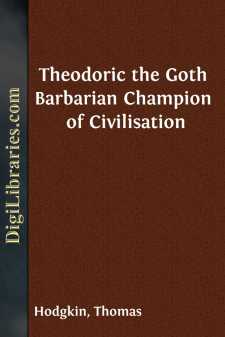Categories
- Antiques & Collectibles 13
- Architecture 36
- Art 48
- Bibles 22
- Biography & Autobiography 813
- Body, Mind & Spirit 142
- Business & Economics 28
- Children's Books 14
- Children's Fiction 11
- Computers 4
- Cooking 94
- Crafts & Hobbies 4
- Drama 346
- Education 46
- Family & Relationships 57
- Fiction 11829
- Games 19
- Gardening 17
- Health & Fitness 34
- History 1377
- House & Home 1
- Humor 147
- Juvenile Fiction 1873
- Juvenile Nonfiction 202
- Language Arts & Disciplines 88
- Law 16
- Literary Collections 686
- Literary Criticism 179
- Mathematics 13
- Medical 41
- Music 40
- Nature 179
- Non-Classifiable 1768
- Performing Arts 7
- Periodicals 1453
- Philosophy 64
- Photography 2
- Poetry 896
- Political Science 203
- Psychology 42
- Reference 154
- Religion 513
- Science 126
- Self-Help 84
- Social Science 81
- Sports & Recreation 34
- Study Aids 3
- Technology & Engineering 59
- Transportation 23
- Travel 463
- True Crime 29
Theodoric the Goth Barbarian Champion of Civilisation
by: Thomas Hodgkin
Categories:
Description:
Excerpt
The fifth and sixth centuries do not supply us with many materials for pictorial illustrations, and I do not know where to look for authentic and contemporary representations of the civil or military life of Theodoric and his subjects. We have, however, a large and interesting store of nearly contemporary works of art at Ravenna, illustrating the ecclesiastical life of the period, and of these the engraver has made considerable use. The statue of Theodoric at Innsbruck, a representation of which is included with the illustrations, possesses, of course, no historical value, but is interesting as showing how deeply the memory of Theodoric's great deeds had impressed itself on the mind of the Middle Ages.
And here I will venture on a word of personal reminiscence. The figure of Theodoric the Ostrogoth has been an interesting and attractive one to me from the days of my boyhood. I well remember walking with a friend on a little hill (then silent and lonely, now covered with houses), looking down on London, and discussing European politics with the earnest interest which young debaters bring to such a theme. The time was in those dark days which followed the revolutions of 1848, when it seemed as if the life of the European nations would be crushed out under the heel of returned and triumphant despotism. For Italy especially, after the defeat of Novara, there seemed no hope. We talked of Mazzini, Cavour, Garibaldi, and discussed the possibility--which then seemed so infinitely remote--that there might one day be a free and united Italy. We both agreed that the vision was a beautiful one, but was there any hope of it ever becoming a reality? My friend thought there was not, and argued from the fact of Italy's divided condition in the past, that she must always be divided in the future. I, who was on the side of hope, felt the weakness of my position, and was driven backward through the centuries, till at length I took refuge in the reign of Theodoric. Surely, under the Ostrogothic king, Italy had been united, strong, and prosperous. My precedent was a remote one, but it was admitted, and it did a little help my cause.
Since that conversation more than forty years have passed. The beautiful land is now united, free, and mighty; and a new generation has arisen, which, though aware of the fact that she was not always thus, has but a faint conception how much blood and how many tears, what thousands of broken hearts and broken lives went to the winning of Italy's freedom. I, too, with fuller knowledge of her early history, am bound to confess that her unity even under Theodoric was not so complete as I then imagined it. But still, as I have more than once stated in the following pages, I look upon his reign as a time full of seeds of promise for Italy and the world, if only these seeds might have had time to germinate and ripen into harvest. Closer study has only confirmed me in the opinion that the Ostrogothic kingdom was one of the great "Might-have-beens" of History.
THOMAS HODGKIN.
NEWCASTLE-ON-TYNE,
January 25, 1891.
CONTENTS.
INTRODUCTION
CHAPTER I.
THEODORIC'S ANCESTORS
Ostrogoths and Visigoths--Nations forming the Gothic Confederacy--Royal family of the Amals--Gothic invasion in the Second Century--Hermanic the Ostrogoth--Inroad of the Huns--Defeat of the Ostrogoths--Defeat of the Visigoths--The Visigoths within the Empire--Battle of Adrianople--Alaric in Rome.
CHAPTER II.
THE MIGHT OF ATTILA
The Ostrogoths under the Huns--The three royal brothers--Attila, king of the Huns--He menaces the Eastern Empire--He strikes at Gaul--Battle of the Catalaunian plains--Invasion of Italy--Destruction of Aquileia--Death of Attila and disruption of his Empire--Settlement of the Ostrogoths in Pannonia....


